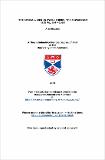"The speciall men in every shere": the Edwardian regime, 1547-1553
Abstract
This thesis examines clienteles during the reign of Edward VI, particularly those of the dukes of
Somerset and Northumberland, and the role of the county elite in political society in order to
reassess politics from the perspective of clientage. Edward's reign has not been extensively
studied from this perspective but work by Dr Adams, Professor Guy and others on other periods
provided the necessary context to reassess Edwardian politics. The aim was to investigate whether
the regime continued to rely on the same core within the county elite employed in the 1520s and
1530s and again in Elizabeth's reign. This has involved extensive archival research since 1996 (in
St Andrews, London and the Midlands). I have found that the privy council tried to foster a closer
working relationship with the county elite in order to maintain stability and prevent faction during
this period of minority government. The regime depended on the same core of gentlemen in the
shires to act as commissioners of the peace and to fill the other vital local offices. Even within this
group there was an inner-ring. This relationship was a two-way process and the clientage that
underpinned early modem society was central to it.
This study has also explored the extent to which Somerset's and Northumberland's clienteles were
involved in central and local government to reassess how much the dukes operated as courtcentred
or county-centred politicians. Both men dominated government in turn and their clienteles
were vitally important. These were made up of their servants, family, friends and clients and were
mutual self-support groups that reinforced their political and social status. Although principally
intended as a political study, this research has come to incorporate military and local history. It
has looked at how clienteles operated during periods of stability and crisis (the activities of Lord
Seymour of Sudeley, the 1549 rebellions, the October coup, the second fall of Somerset and the
succession crisis in 1553) in order to demonstrate how they really functioned.
Type
Thesis, PhD Doctor of Philosophy
Collections
Items in the St Andrews Research Repository are protected by copyright, with all rights reserved, unless otherwise indicated.

